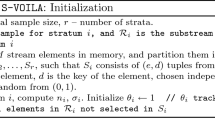Abstract
In this paper, we propose efficient distributed algorithms for three holistic aggregation functions on random regular graphs that are good candidates for network topology in next-generation data centers. The three holistic aggregation functions include SELECTION (select the k-th largest or smallest element), DISTINCT (query the count of distinct elements), MODE (query the most frequent element). We design three basic techniques — Pre-order Network Partition, Pairwise-independent Random Walk, and Random Permutation Delivery, and devise the algorithms based on the techniques. The round complexity of the distributed SELECTION is Θ(log N) which meets the lower bound where N is the number of nodes and each node holds a numeric element. The round complexity of the distributed DISTINCT and MODE algorithms are O(log3N / log log N) and O(log2N log log N) respectively. All of our results break the lower bounds obtained on general graphs and our distributed algorithms are all based on the \({\cal C}{\cal O}{\cal N}{\cal G}{\cal E}{\cal S}{\cal T}\) model, which restricts each node to send only O(log N) bits on each edge in one round under synchronous communications.
Similar content being viewed by others
References
Kuhn F, Locher T, Wattenhofer R. Tight bounds for distributed selection. In: Proceedings of the 19th Annual ACM Symposium on Parallel Algorithms and Architectures, 2007
Li X Y, Wang Y J, Wang Y. Complexity of data collection, aggregation, and selection for wireless sensor networks. IEEE Trans Comput, 2011, 60: 386–399
Li H, Wu C, Hua Q S, et al. Latency-minimizing data aggregation in wireless sensor networks under physical interference model. Ad Hoc Netw, 2014, 12: 52–68
Bawa M, Garcia-Molina H, Gionis A, et al. Estimating Aggregates on a Peer-to-peer Network. Technical Report, 2003
Guan Z T, Zhang Y, Zhu L H, et al. EFFECT: an efficient flexible privacy-preserving data aggregation scheme with authentication in smart grid. Sci China Inf Sci, 2019, 62: 032103
Peleg D. Distributed Computing: A Locality Sensitive Approach. Philadelphia: Society for Industrial and Applied Mathematics, 2000
Locher T. Foundations of aggregation and synchronization in distributed systems. Dissertation for Ph.D. Degree. Zurich: ETH Zurich, 2009
Kuhn F, Locher T, Schmid S. Distributed computation of the mode. In: Proceedings of the 27th ACM Symposium on Principles of Distributed Computing, 2008
Wormald N C. Models of random regular graphs. In: London Mathematical Society Lecture Note Series. Cambridge: Cambridge University Press, 1999
Singla A, Hong C, Popa L, et al. Jellyfish: networking data centers randomly. In: Proceedings of the 9th USENIX Conference on Networked Systems Design and Implementation, 2012
Singla A, Godfrey P B, Kolla A. High throughput data center topology design. In: Proceedings of the 11th USENIX Conference on Networked Systems Design and Implementation, 2014
Leiserson C E. Fat-trees: universal networks for hardware-efficient supercomputing. IEEE Trans Comput, 1985, C-34: 892–901
Harary F, Hayes J P, Wu H J. A survey of the theory of hypercube graphs. Comput Math Appl, 1988, 15: 277–289
Jyothi S A, Singla A, Godfrey B, et al. Measuring and understanding throughput of network topologies. In: Proceedings of the International Conference for High Performance Computing, Networking, Storage and Analysis, 2016. 1–12
Singla A. Fat-free topologies. In: Proceedings of the 15th ACM Workshop on Hot Topics in Networks, 2016. 64–70
Kassing S, Valadarsky A, Shahaf G, et al. Beyond fat-trees without antennae, mirrors, and disco-balls. In: Proceedings of the Conference of the ACM Special Interest Group on Data Communication, 2017. 281–294
Valadarsky A, Dinitz M, Schapira M. Xpander: unveiling the secrets of high-performance datacenters. In: Proceedings of the 14th ACM Workshop on Hot Topics in Networks, Philadelphia, 2015
Valadarsky A, Shahaf G, Dinitz M, et al. Xpander: towards optimal-performance datacenters. In: Proceedings of the 12th International on Conference on Emerging Networking Experiments and Technologies, Irvine, 2016
Broder A Z, Shamir E. On the second eigenvalue of random regular graphs (preliminary version). In: Proceedings of the 28th Annual Symposium on Foundations of Computer Science, Los Angeles, 1987
Boyd S P, Ghosh A, Prabhakar B, et al. Randomized gossip algorithms. IEEE Trans Inform Theor, 2006, 52: 2508–2530
Leighton F T, Maggs B M, Rao S. Packet routing and job-shop scheduling in O(congestion + dilation) steps. Combinatorica, 1994, 2: 167–186
Vocking B. Shortest Paths Routing on Arbitrary Networks. Dissertation for Master’s Degree. Paderborn: Universität Paderborn, 1994
Newman I. Private vs. common random bits in communication complexity. Inf Process Lett, 1991, 39: 67–71
Acknowledgements
This work was supported in part by National Natural Science Foundation of China (Grant Nos. 61972447, 61832006) and the Fundamental Research Funds for the Central Universities (Grant No. 2019kfyXKJC021). We thank the anonymous reviewers for the helpful comments to improve the presentation of this paper.
Author information
Authors and Affiliations
Corresponding author
Rights and permissions
About this article
Cite this article
Jia, L., Hua, QS., Fan, H. et al. Efficient distributed algorithms for holistic aggregation functions on random regular graphs. Sci. China Inf. Sci. 65, 152101 (2022). https://doi.org/10.1007/s11432-020-2996-2
Received:
Revised:
Accepted:
Published:
DOI: https://doi.org/10.1007/s11432-020-2996-2




